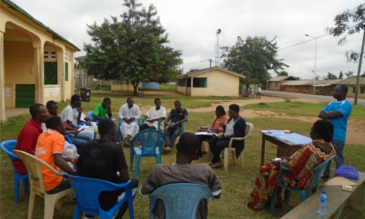
Factors contributing to the persistence of Lymphatic Filariasis transmission in some districts in Ghana
The Social Science team from Dodowa Health Research Centre will work collaboratively with the team from CSIR to identify the barriers and opportunities for implementing Mass Drug Administration (MDA) to eliminate lymphatic filariasis in districts with persistent transmission. The research will determine service delivery factors affecting the interruption of transmission of LF, identify factors that affect community participation in the MDA process and to identify and design/test strategies for effective implementation of MDA with continuous monitoring.
The district with the highest prevalence of infection of the disease in each zone was selected for the study. Different socio-economic factors affect the intervention process differently in these zones. Issues of migration and cross-border have been prominent in the middle and the northern belts respectively. Socio-economic activities of the areas also affect the successful implementation of activities towards the elimination of the disease. This led to COUNTDOWN using different strategies that apply for the different areas.
Health Systems Strengthening and Collaboration
The aim of this study is to assess the processes, opportunities and costs of integrating NTD care into the broader health system in Ghana.
To assess the efficiency, equity and sustainability of current NTD control approaches, with a specific focus on end-user perspectives, to develop potential interventions to strengthen programmes at the national, district, community and household level.
The applied social science theme (MST 2) within COUNTDOWN uses a health systems research approach to focus on implementation research questions identified by practitioners working on NTD control. Implementation research questions are geared toward achieving effective integration and scale-up of NTD control and elimination within Ghana as well as generating generalizable lessons for the wider African region.
Focus group discussions will be completed with community members; health workers and community drug distributors to understand current knowledge, attitudes and behaviours in relation to the five priority NTDs focused on within the COUNTDOWN’s programme of work.
There will be the use of in-depth interviews to follow-up with specific individuals of marginalised populations such as parents of out-of-school children, people living with disability, and groups who may not be able to use current NTD regimens, like pregnant women. This should give an insight into how they would prefer to best access MDA programmes.
The research will employ ‘photo-voice’ which is the process whereby individuals photograph their everyday work and realities and then compose written or verbal narratives to accompany the photographs. This method has been used with community health workers or community drug distributors who are involved with NTD control activities to understand their everyday experiences.
